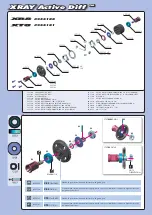
THE 2.4GHz RADIO SYSTEM
THE 2.4GHz RADIO SYSTEM
Your model includes a 2.4GHz transmitter. When powered
on, the transmitter will automatically locate and lock onto an
available frequency, allowing multiple models to be raced
together without frequency conflicts. The included radio
system has been programmed for your model at the factory
and does not require adjustment, but it does have settings
you may need to access to maintain proper operation of
your model. The detailed instructions (page 9) included
in this manual will help you understand and operate the
functions of the radio system. For additional information and
how-to videos, visit LaTrax.com.
RADIO AND POWER
SYSTEM TERMINOLOGY
Please take a moment to familiarize yourself with these
radio and power system terms. They will be used
throughout this manual.
2.4GHz Spread Spectrum
– This model is equipped with
the latest R/C technology. Unlike AM and FM systems
that require frequency crystals and are prone to frequency
conflicts, the 2.4GHz radio system automatically selects
and locks onto an open frequency, offering superior
resistance to interference and “glitching.”
BEC (Battery Eliminator Circuit)
- The BEC can either
be in the receiver or in the ESC. This circuit allows the
receiver and servos to be powered by the main battery
pack in an electric model. This eliminates the need to
carry a separate pack of 4 AA batteries to power the radio
equipment.
Current
- Current is a measure of power flow through the
electronics, usually measured in amps. If you look at wire
like a garden hose, current is a measure of how much
water is flowing through the hose.
Electronic Speed Control (ESC)
- An electronic speed
control is the electronic motor control inside the model.
ESCs use power more efficiently than mechanical speed
controls so that the battery runs longer. An ESC also has
circuitry that prevents loss of steering and throttle control
as the battery loses its charge.
Frequency band
- The radio frequency used by the
transmitter to send signals to your model. This model
operates on the 2.4GHz direct-sequence spread
spectrum.
mAh
– Abbreviation for milliamp hour, a measure of the
capacity of the battery pack. The higher the number, the
longer the battery will last between recharges.
Neutral position
- The standing position that the servos
seek when the transmitter controls are at the neutral
setting.
NiMH
- Abbreviation for nickel-metal hydride.
Rechargeable NiMH batteries offer high current handling
and much greater resistance to the “memory” effect.
NiMH batteries generally allow higher capacity than
NiCad batteries. They can last up to 500 charge cycles. A
peak charger designed for NiMH batteries is required for
optimal performance.
Receiver
- The radio unit inside your model that receives
signals from the transmitter and relays them to the servos.
Resistance
- In an electrical sense, resistance is a
measure of how an object resists or obstructs the flow
of current through it. When flow is constricted, energy
is converted to heat and is lost. The power system is
optimized to reduce electrical resistance and the resulting
power-robbing heat.
Servo
- Small motor unit in your model that operates the
steering mechanism.
Transmitter
- The hand-held radio unit that sends throttle
and steering instructions to your model.
Trim
- The fine-tuning adjustment of the neutral position
of the servos, made by adjusting the steering trim knob on
the face of the transmitter.
Thermal Shutdown Protection
- Temperature sensing
electronics used in the ESC detect overloading and
overheating of the transistor circuitry. If excessive
temperature is detected, the unit automatically shuts
down to prevent damage to the electronics.
2-channel radio system
- The 2.4GHz radio system,
consisting of the receiver, the transmitter, and the servos.
The system uses two channels: one to operate the throttle
and one to operate the steering.
Voltage
- Voltage is a measure of the electrical potential
difference between two points, such as between the
positive battery terminal and ground. Using the analogy
of the garden hose, while current is the quantity of water
flow in the hose, voltage corresponds to the pressure that
is forcing the water through the hose.


































